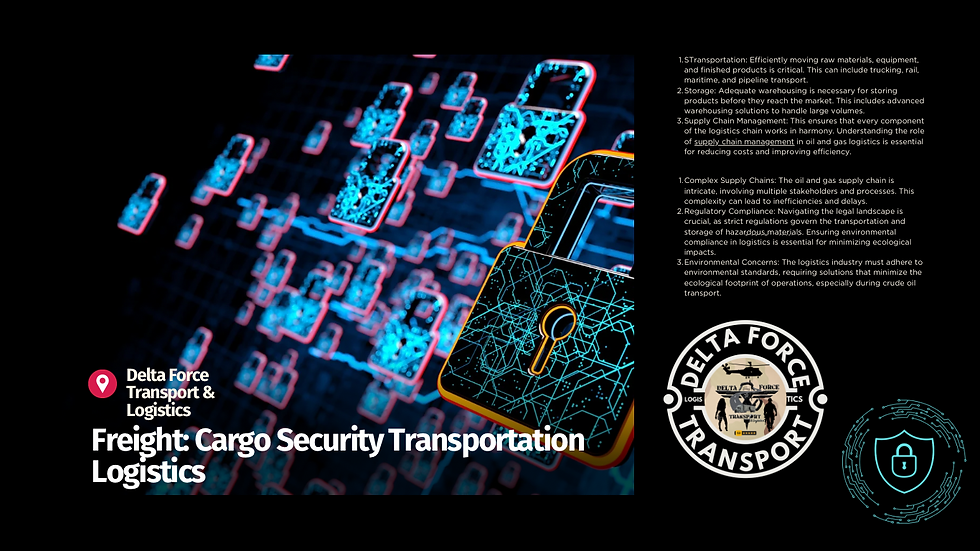2026:Freight Security Tips for a Safe Cargo in the Global Supply Chain
- Feb 17
- 4 min read
For many shippers, the fear of cargo being lost, damaged, or compromised during transit is a real concern. This worry becomes even more pressing for those managing international supply chains, where unpredictable factors like geopolitical tensions, tariffs, piracy, natural disasters, and more can have a significant impact.
Ensuring the safety and integrity of your cargo as it moves through the supply chain is critical. But how can you be fully confident in the security of your shipments at every stage?
At Delta Force Transport & Logistics, we specialize in helping businesses of all sizes—whether domestic or international—manage their supply chains securely. Our experience in this field enables us to share valuable insights on freight security practices for global supply chains and offer advice on how you can contribute to safeguarding your cargo.
In this article, we’ll walk you through the common methods global transportation providers use to keep shipments safe and provide actionable tips for shippers. By the end, you’ll have the peace of mind that comes with knowing your supply chain is secure and the knowledge to make informed decisions that will protect it.
Global supply chains depend on the smooth, safe movement of goods across borders, continents, and oceans. Experienced freight carriers understand the many risks involved in this complex process and employ various security measures to ensure your cargo reaches its destination intact.
Here are some of the most common ways freight carriers secure cargo in transit:
In international logistics, "the devil is in the details." Proper paperwork is your first line of defense against issues like customs delays, theft, or mis-delivery. International shipments require essential documents such as a bill of lading (BOL), an invoice, and a packing list. Depending on whether you're importing or exporting, there may also be specific forms you need to file.
For example, if you're importing goods to the U.S. by ocean, you must submit an Importer Security Filing (ISF) at least 24 hours before the vessel departs. Failing to file the ISF could lead to additional fees, delays, and more inspections.
Similarly, if you're exporting from the U.S., an Electronic Export Information (EEI) form is required through the Automated Export System (AES), except in certain cases. These forms ensure compliance with trade regulations and facilitate smooth customs clearance.
Your carrier will generally handle most of the paperwork, but it's your responsibility to provide them with the necessary information promptly.
Reliable freight carriers work to minimize the risks of tampering, theft, and damage during transit through packaging, tracking technologies, and inspections.
Packaging: Your carrier will advise on the best packaging methods for your cargo, which may include containerization, palletization, or crating. Some containers also come with digital or manual locks, and seals are used for additional security. Any broken seals are immediately noticeable to customs agents and carriers, prompting an inspection.
Tracking: With real-time tracking, shippers can monitor their cargo's journey from origin to destination. Many carriers utilize GPS, geofencing, and tamper-detection sensors, providing peace of mind that your goods are being tracked and protected throughout transit.
Inspections: Cargo is typically inspected before shipment and throughout its journey. Inspections can range from verifying quantity and condition to visual checks and even scans (like X-rays) at border crossings. When customs opens a sealed shipment, they must notify the carrier and reseal the cargo with a new number for tracking.
Once the shipment is close to its final destination, drivers inspect the cargo for damage, tampering, or missing elements before signing off on the BOL
https://www.deltaforcetransport-logistics.com. https://www.deltaforcetransport-logistics.com/militaryfreight #freightshipping #expeditedfreight #aircargo #freight
While freight carriers play a significant role in cargo security, shippers also have a part to play. Here are four practical tips to enhance your supply chain security:
The foundation of your supply chain’s security lies in choosing a reputable carrier. Select a carrier with years of experience, a proven track record, and a commitment to safety. Look for memberships in selective carrier networks like WCAworld or United Ocean Lines, which ensure carriers meet stringent safety and compliance standards. Also, check for certifications like Customs-Trade Partnership Against Terrorism (CTPAT).
Ask potential carriers about their security standards and request references from other shippers. This will help you make an informed decision.
High-value or sensitive goods (such as electronics or pharmaceuticals) may require extra protection. Options include GPS tracking, container seals, cargo insurance, or even escorts. While these measures add costs, they can significantly improve the security of your shipment. Work with your carrier to create a layered security strategy that combines physical measures, technology, and risk mitigation.
Ensure that all paperwork is completed accurately before your cargo leaves its origin. Mistakes in documentation can cause delays and expose your cargo to unnecessary risks. Check for misspellings, numerical errors, and missing details. Collaborate with your carrier to make sure everything is in order.
The global geopolitical landscape is constantly changing. Political unrest, natural disasters, and trade disputes can disrupt your supply chain. Staying up to date on global news can help you anticipate potential disruptions and reroute shipments if needed. Understanding where and when your cargo will be traveling helps you avoid risky regions and minimize delays.
By choosing trusted carriers, staying informed about global events, and considering additional protective steps, you can significantly reduce the risks to your cargo. A layered security approach—combining physical, technological, and strategic measures—ensures the best protection for your shipments.
At Delta Force Transport & Logistics, we're committed to providing the expertise, solutions, and partnerships needed to safeguard your cargo. With the right security strategy in place, you can confidently navigate your global supply chain with peace of mind.







Comments